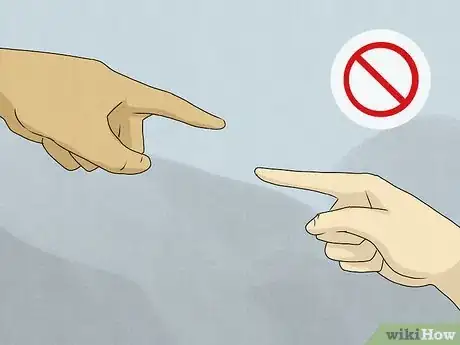This article was co-authored by Allen Wagner, MFT, MA and by wikiHow staff writer, Janice Tieperman. Allen Wagner is a licensed marriage and family therapist based in Los Angeles, California. He received his Master's in Psychology from Pepperdine University in 2004. He specializes in working with individuals and couples on ways they can improve their relationships. Along with his wife, Talia Wagner, he's the author of Married Roommates.
There are 12 references cited in this article, which can be found at the bottom of the page.
wikiHow marks an article as reader-approved once it receives enough positive feedback. In this case, 83% of readers who voted found the article helpful, earning it our reader-approved status.
This article has been viewed 753,245 times.
If you’ve hit a rough patch in your relationship, you’re in good company. For better or for worse, most relationships come with high and low points. Don’t worry. We’ve put together some psychologist-backed tips and tricks that will help you connect and communicate with your partner in a healthy, productive way.
Steps
Expert Q&A
-
QuestionHow can I change my relationship?
 Klare Heston, LCSWKlare Heston is a Licensed Independent Clinical Social Worker based in Cleveland, Ohio. With experience in academic counseling and clinical supervision, Klare received her Master of Social Work from the Virginia Commonwealth University in 1983. She also holds a 2-Year Post-Graduate Certificate from the Gestalt Institute of Cleveland, as well as certification in Family Therapy, Supervision, Mediation, and Trauma Recovery and Treatment (EMDR).
Klare Heston, LCSWKlare Heston is a Licensed Independent Clinical Social Worker based in Cleveland, Ohio. With experience in academic counseling and clinical supervision, Klare received her Master of Social Work from the Virginia Commonwealth University in 1983. She also holds a 2-Year Post-Graduate Certificate from the Gestalt Institute of Cleveland, as well as certification in Family Therapy, Supervision, Mediation, and Trauma Recovery and Treatment (EMDR).
Licensed Social Worker The thing you have control over is YOU, not your partner. Identify behaviors that you and your spouse have discussed in the past. Begin to address them and make small changes. In the meantime, stop making any negative comments to your spouse.
The thing you have control over is YOU, not your partner. Identify behaviors that you and your spouse have discussed in the past. Begin to address them and make small changes. In the meantime, stop making any negative comments to your spouse.
References
- ↑ https://www.helpguide.org/articles/relationships-communication/relationship-help.htm
- ↑ https://psychcentral.com/blog/9-steps-to-better-communication-today
- ↑ https://www.psychologytoday.com/us/blog/close-encounters/201704/10-tips-solving-relationship-conflicts
- ↑ https://psychcentral.com/lib/become-a-better-listener-active-listening
- ↑ https://www.psychologytoday.com/us/blog/close-encounters/201704/10-tips-solving-relationship-conflicts
- ↑ https://www.psychologytoday.com/us/blog/tech-support/201410/6-steps-repairing-your-relationship
- ↑ https://www.scientificamerican.com/article/which-of-these-four-attachment-styles-is-yours/
- ↑ https://www.psychologytoday.com/us/blog/tech-support/201410/6-steps-repairing-your-relationship
- ↑ https://psychcentral.com/lib/how-to-change-your-attachment-style
- ↑ https://www.psychologytoday.com/us/blog/compassion-matters/201301/6-ways-you-can-fix-your-relationship-your-own
- ↑ https://www.psychologytoday.com/us/blog/fixing-families/201208/relationship-repair-10-tips-thinking-therapist
- ↑ https://www.psychologytoday.com/us/blog/fixing-families/201208/relationship-repair-10-tips-thinking-therapist
- ↑ https://www.psychologytoday.com/us/blog/tech-support/201410/6-steps-repairing-your-relationship
- ↑ https://www.psychalive.org/how-to-fix-a-relationship/
- ↑ https://www.helpguide.org/articles/relationships-communication/relationship-help.htm
- ↑ https://www.psychologytoday.com/us/blog/tech-support/201410/6-steps-repairing-your-relationship
- ↑ https://www.psychologytoday.com/us/blog/tech-support/201410/6-steps-repairing-your-relationship
- ↑ https://www.apa.org/topics/money/conflict
- ↑ https://www.mayoclinic.org/healthy-lifestyle/adult-health/in-depth/infidelity/art-20048424
About This Article
To fix a relationship, talk to your partner whenever something is bothering you, even if it's small, so you're not bottling up your feelings. Although it's not always easy, try your best to stay calm when you talk to them about how you feel, and avoid blaming them or bringing up the past. Once you've been honest with each other, focus on reconnecting with your partner by making time for them every day, going on regular dates again, and being affectionate. For tips from our reviewer on how to overcome relationship hurdles, read on!












































































